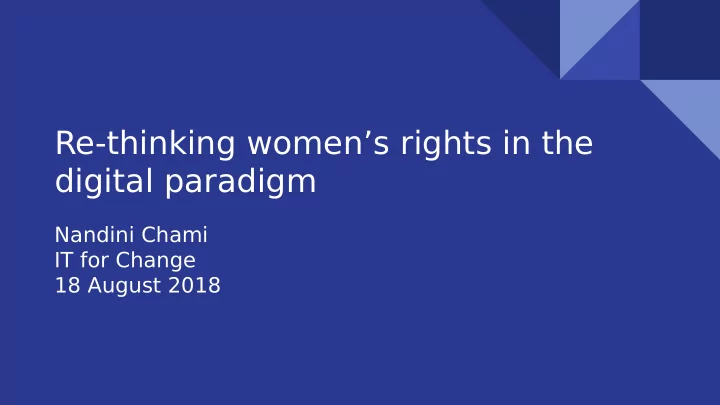

Re-thinking women’s rights in the digital paradigm Nandini Chami IT for Change 18 August 2018
Part 1. The digital paradigm
Digital technologies are not just tools/ instruments
They are the material infrastructures of a new social order
When you think about women’s rights in the digital paradigm, what comes to your mind?
Structure of the presentation Reflections on women’s rights in the digital paradigm: Story 1. The EQUALS partnership Story 2. Bhanwari Devi wikipage Story 3. ICT jobs for women Story 4. when women’s rights gets co-opted…
Story 1. EQUALS partnership
What EQUALS does not acknowledge
The access trap Business as usual strategies cannot fix the “access trap” that reinforces the gender digital divide. Despite the fact that the spread of Internet services is nowhere close to saturation, the global growth rate of Internet users has already started to slow down. The bulk of those who are disconnected tend to be located in more remote, rural areas[and] consist disproportionately of poorer, minority, less educated, and often female, members of society. - Broadband Commission
India and the access trap Take the case of India. – yawning gender divide in access (rural women being the most disadvantaged) - evidence suggests that market strategies such as Reliance Jio have not really brought in the unconnected online (Gairola 2017) - failure to effectively utilise Universal Service Obligation Fund
Access does not automatically open up empowering opportunities for women
Story 2.Bhanwari devi wiki: Free as in sexist?
Story 3. A closer look at the ‘ICT skills and jobs for women’ narrative
Question of survival, rather than one of lost job opportunities For every new job that digitalization has opened up, … (we) may not realize what job opportunities are being taken away, because in the first place, the majority are in the informal sector and may not be easily visible. A squeeze on the informal sector will not really take the form of outright ‘job’ losses; indeed, in most cases there are not ‘jobs’ as such, to be lost, but livelihoods. What would happen is a steady compression of incomes, making survival precarious.
Story 4. When women’s rights is co- opted in trade politics
Why did women’s groups from the South fjnd the Declaration objectionable? Bringing an e-commerce agenda already rejected by Southern governments through the backdoor: - Lowering customs duties - Prohibiting requirements of “domestic presence” (registration of the business in the country so that it can operate)
Why this concerns the current discussion
Conclusions Women’s human rights agenda in the digital paradigm not just about civic-political liberties equally about socio-economic rights, and the connections between gender justice and right to development agendas.
Conclusions (contd.) shifting the opportunity structure and expanding life choices in the digital paradigm takes more than access. contestations between different sets of rights will need to be balanced.
In the fjnal analysis... No empowerment without rights… No rights without politics.
Recommend
More recommend